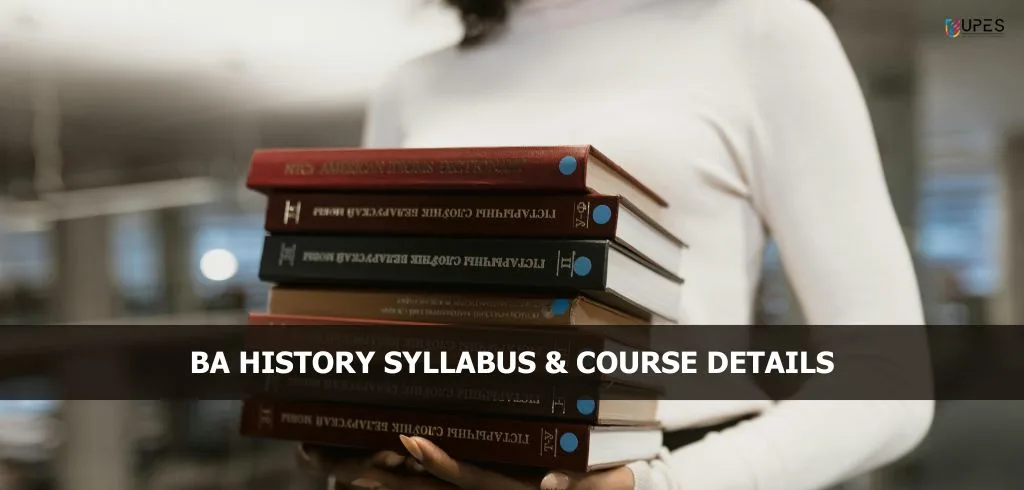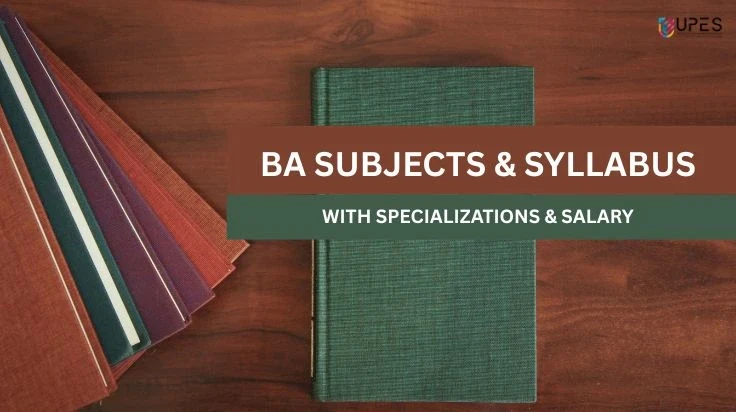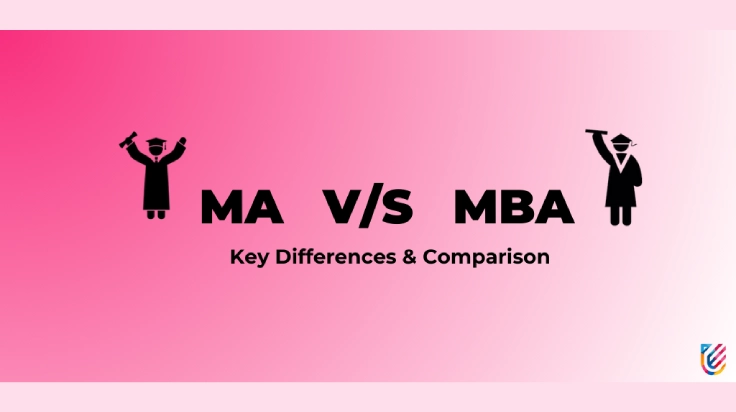BA History Syllabus: Semester-Wise Subjects & Course Details
- UPES Editorial Team
- Published 14/04/2025

Table of Contents:
History enthusiasts assemble! All those who are fascinated by civilisations, monuments, how societies have evolved, shaped, and transformed across time can find their calling in studying and pursuing history. However, before enrolling yourself in a discipline that will require you to hit the libraries often should know at least the BA History syllabus.
A BA in History can open doors to a wide range of careers—from academics and research to civil services and heritage management. By the end of this blog, you will be knowledgeable of BA History Syllabus and how to navigate through them.
Become future-ready with our Liberal Studies programs
Know MoreWhat is the syllabus of BA History?
The BA History syllabus is typically divided into 6 semesters over 3-years. It is designed to offer a balanced mix of core subjects, electives, skill-based learning, and research exposure.
The syllabus includes Indian and world history, historical theories, cultural studies, political transitions, and modern socio-economic transformations. It also offers electives and skill-based papers.
BA History 1st Year Syllabus
1st year Syllabus of BA history degree course teaches you ancient India, early communities around the world, subjects like the Mauryan Empire, the Vedic period, and Indus Valley Civilization. Develop your basic communication skills through English or MIL-based courses.
Semester 1:
Maiden semester of BA History introduces students to ancient Indian history up to 300 CE, global ancient societies, historical methods, and foundational subjects like English for enhancing communication.
- History of India – From Earliest Times to 300 CE
- Social Formations and Cultural Patterns of the Ancient World
- Introduction to History & Historiography
- Ability Enhancement: English/MIL Communication
Semester 2:
India's history between 300 and 1200 CE, medieval global cultures, environmental awareness, public speaking, and an interdisciplinary elective for a more comprehensive education are all covered in the 2nd semester of the BA in History program.
- History of India – 300 to 1200 CE
- Social Formations and Cultural Patterns of the Medieval World
- Environmental Awareness or Public Speaking (AECC)
- Generic Elective (Interdisciplinary paper)
BA History 2nd Year Syllabus
Get skill-based and elective course options in the 2nd year syllabus along with history, west origins, and public speaking.
Semester 3:
In the 3rd semester, BA History students study early modern Europe and Indian history from 1200 to 1750 CE. They also learn useful skills like museum curation and archival research.
- History of India – 1200 to 1750 CE
- Rise of Modern West – I
- Skill Enhancement Course (e.g., Archival Studies, Museum Curation)
- Generic Elective Paper
Semester 4:
4th Semester teaches India's transition from 1750 to 1950 CE, the development of the contemporary West, a practical skills course, and a general elective.
- History of India – 1750 to 1950 CE
- Rise of Modern West – II
- Skill Enhancement Course
- Generic Elective Paper
Read More: Top BA Specializations for Students in 2025
BA History 3rd Year Syllabus
From world politics and contemporary Indian to European history and research techniques, 3rd year comes along with a dissertation incorporating both discipline-specific and multidisciplinary electives.
Semester 5:
Penultimate semester covers the Indian National Movement, Modern Europe (1789–1919), specialty electives such Southeast Asian or African history, and fundamental research techniques.
- Modern Europe – 1789 to 1919
- Indian National Movement
- Discipline-Specific Electives (e.g., History of Southeast Asia, African History)
- Research Methodology
Semester 6:
In the 6th and final Semester of the degree program, students study international relations, world politics, and contemporary Indian history. They also finish elective papers and a research-based project or dissertation.
- History of Contemporary India
- World Politics and International Relations
- Project Work/Dissertation
- Elective Papers
BA History syllabus is usually an eclectic mix of different historical timelines of historically important events across the globe, helping students have an idea of how societies, cultures, and civilizations have progressed.
Is the syllabus the same in all universities?
While the core structure remains similar, universities like UPES offer unique electives and integrated learning experiences to align with global standards.
How to Master BA History syllabus?
To master the syllabus of BA History, a rigorous discipline accompanied with careful studying and analysis of the syllabus is required. More than just reading books, you need to learn critical analysis along with acute referring to the works of renowned historians, scholars, and academicians.
Whether you're in your first year or preparing for your final semester, here are some tips to help you stay ahead:
- Understand the Timeline, Don’t Just Memorize Dates: Mastering history is more than just mugging updates and events. It is about looking at those events with a critical lens of study, analysing similar patterns visible across different civilisations, and coming up with theories. Rather than rote-learning events, try to understand the causes, consequences, and interlinkages. Creating timelines and mind maps can help visualize historical developments across regions and periods.
- Refer to Recommended Readings: To thoroughly understand an event, one needs to go beyond the text. Books by historians like Romila Thapar, Bipan Chandra, and Eric Hobsbawm must be referred to gain insights and diverse perspectives.
- Practise Answer Writing: Be prepared to fill pages after pages in exams. For that, you need to frequently practise answer writing. Learn to form an outline, assemble ideas, refer to scholars, and write answers that make sense from beginning till end.
- Stay Updated with Research Trends: The BA History 3rd year syllabus often includes project work and research methodology. Explore academic journals, attend webinars, or follow university publications to stay informed about emerging themes in historical studies.
- Use Digital Resources: Leverage platforms like NPTEL, SWAYAM, and YouTube lectures for difficult topics. Listening to diverse perspectives enriches your conceptual clarity—particularly helpful for BA History 1st year syllabus students.
- Group Discussions & Peer Learning: Any historical event can be looked at from various standpoints. The more you mingle with your seniors, peers, and even juniors and discuss global events, the more nuanced your own understanding will become. It’s especially effective during semesters focused on comparative histories and historiography.
By combining these strategies with a consistent study schedule, you can master the BA History semester-wise syllabus and build a strong academic foundation.
UPES and BA History
At UPES School of Liberal Studies and Media, the BA History program offers holistic training, combining rigorous academic knowledge with practical exposure. Students benefit from interdisciplinary curriculum, expert faculty, special lectures by renowned historians, research projects, seminars, paper presentations, discussion forum, and other intellectual activities happening in the history department. Apart from an exceptional theoretical knowledge, students learn through internships, industry projects, and real-world challenges. With access to state-of-the-art labs and global certifications, you get a robust training in critical analysis and study. Studying at a premiere institution such as UPES also empowers you in terms of industry connect, job opportunities, and networking. With UPES’s strong placement record, a lucrative and rewarding career awaits you in education, policy, journalism, and civil services.

Our counsellors are just a click away.
Conclusion
Whether you're looking to crack UPSC, become a historian, or work in heritage management, understanding the BA History semester-wise syllabus is the first step. With institutions like UPES offering an industry-aligned and research-driven curriculum, you’ll be well-equipped to shape your future in the world of history. Apply to BA History program at UPES School of Liberal Studies and Media today!
UPES Editorial Team
Written by the UPES Editorial Team
UPES Admission Enquiry
Subscribe to UPES Blogs
Join our community for exclusive stories, insights, and updates
By clicking the "Subscribe" button, I agree and accept the privacy policy of UPES.































